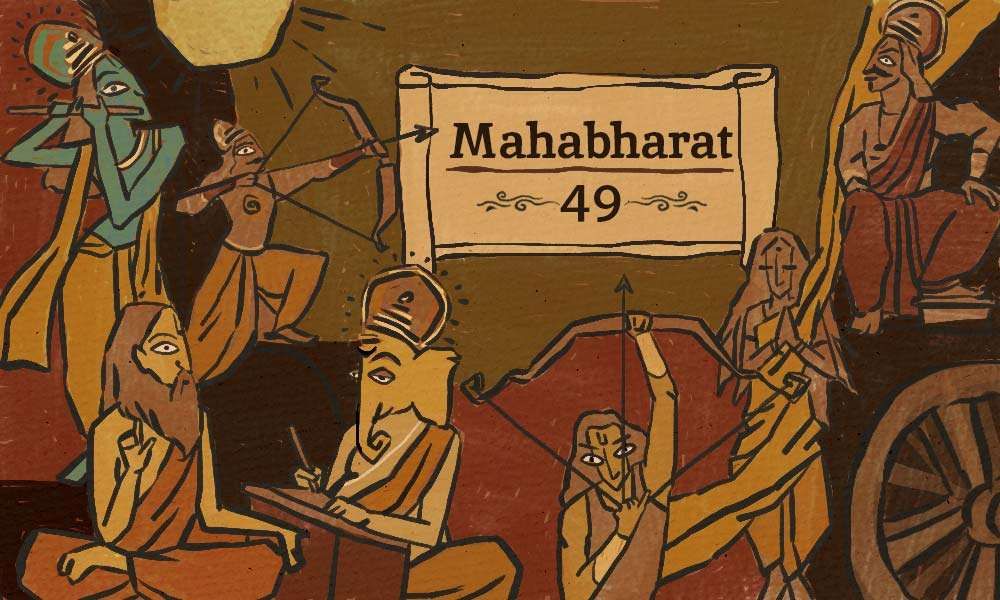The Real Reason Gandhari Chose To Be Blindfolded
Why did Gandhari decide to blindfold herself after her marriage to Dhritarashtra? It was not out of love and devotion to her husband, as Sadhguru explains here.

Questioner: Pranam, Sadhguru. My question has to do with that aspect of dharma which a person decides for his ultimate liberation – when Bhishma decides Brahmacharya, or Karna decides friendship, and Gandhari decides being an ardhangini as a method to reach one’s ultimate nature. On what basis does one decide this?
Subscribe
Suppose, as a young woman, your marriage is fixed, and you go there and realize your husband is blind. It was a big shock. Above all, if you go a little further back, her horoscope says, “Whoever marries her will die in three months’ time.” She would have gone through many things when her parents and brothers knew they could not get her married. Especially in a family like that, when you have brothers like Shakuni, many unpleasant things would have happened.
Then the humiliation of marrying a goat, then killing your “husband,” then deceiving the next husband by not telling him that you were married earlier, and then going there and realizing he is actually blind. If you look at it, what all this does to your mind is not a small thing. In today’s society, you are educated. You can say, “To hell with this marriage – I’ll go and work somewhere.” This was not the situation back then. Five thousand years ago, either you got married and made your life, or you had no life.
Above all, living with a blind man means you will have to do everything for him. But if you are blind, everyone will do everything for you. Mark Twain said this: “Never learn to do anything: If you don’t learn, you’ll always find someone else to do it for you.” Being a queen, everything gets taken care of for Gandhari. I am not trying to ridicule the whole thing. These are the many things she thought of. Human mind considers everything. No one is innocent of that.
Another aspect is when you have consciously chosen to be blind, the greatness that comes with it is unbelievable. Such a tremendous sacrifice! Every moment of your life, people will say, “Wow! What a woman! She lives blind for her husband.” If you are a sensible woman and you love the man, if you have sense in your head and love in your heart, you should be his eyes. But she took the other route, because there is personal glory in sacrifice. There is no personal glory in getting up every day in the morning and doing what is needed. But there is personal glory in tying a strip around your eyes. Now both of them have to be helped.
And once you take a public vow, you cannot go back on it. As a queen, even in your bathroom, you cannot take off the blindfold, because helpers are waiting everywhere for you. If you were a private person, at least in the bathroom, you could have taken it off and danced. Considering all this, she took that step. Once you have taken such a step, however bad it may be, initially, you will crib; you will struggle; you will be depressed; you will fight. But once you realize there is no way out of it, you will see how to make the best out of it. Because the intelligence always kicks in to somehow make the best out of it.
She thought, “Anyway I have chosen to be blind – let me use my blindness for my wellbeing.” That is not even a thought – life naturally moves in that direction. If that level of intelligence to reconcile with life was not there in a human being, every human being would have a broken mind by now.
To be continued..
Editor’s Note: A version of this article was originally published in the Forest Flower magazine, June 2019. To subscribe online, click here. The Mahabharat series is based on Sadhguru’s talks during the one-time Mahabharat program that took place in February 2012 at the Isha Yoga Center. Through the lives and stories of the varied characters, Sadhguru takes us on a mystical exploration into the wisdom of this immortal saga.


